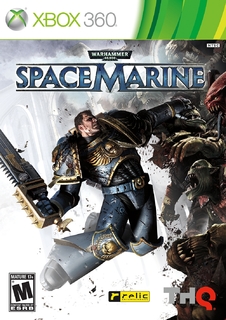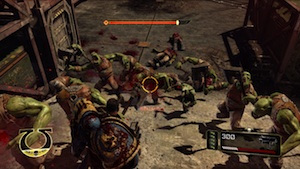
None of this is to suggest Space Marine is a bad game. It definitely isn't. A steal at a mere £1.50 from your local digital pawn shop, you are Captain Titus, dispatched to the factory (or, in the parlance, forge) world of Graia to stymie a sneak invasion by an army of space Orks. Yes, in the nightmarish future of the 41st Millennium - the setting for Games Workshop's brutally dystopian Warhammer 40,000 franchise - assigning a few of the Imperium's finest can see off mobs of aliens and other nasties. And so Space Marine has you merrily chopping and smashing your way through the green-skinned Orkoid hordes with a variety of melee weapons (knife, chainsword, power axe, a warhammer). For traditional shooter fans, there are plenty of ranged weapons from GW's 40k army lists to play with. The bolter offers your standard machine gun experience, but there's fun to be had with las cannon and plasma rifles too. This gives you a choice between play-styles, but at times using one or the other is unavoidable. The annoying big orks who come at you swinging a club are difficult to put down with gun fire (though a few bursts of las cannon sorts them out), and so mucho button mashing beckons. And, of course, this being a GW game Chaos has to be revealed as the real bad 'un machinating behind the scenes.
There's not much more to say about Space Marine as a game. It follows the standard fighting/cut scene/fighting/cut scene format to move the plot along, interspersed with a periodic boss confrontation and "shocking" plot twists. Oh, it also turns out the Titus is a bit special too. In all, an enjoyable if well trod romp that offered little new on its release.

By way of a quick precis for the uninitiated, the far future of the last decade of the 41st Millennium sees the human Imperium as the dominant power in the galaxy, with colonies scattered over a million habitable worlds. But this is a dark age of regression and superstition. There is little technological development as our descendants worship the manufactories, ships, and war machines bequeathed by earlier ages of space colonisation and scientific achievement. To make matters worse, the Imperium is a xenophobic and genocidal entity constantly at war with several alien races. And at its heart lies the emperor, an emaciated superhuman corpse whose soul stuff acts as a beacon that enables interstellar travel through the shifting medium of warp space. The warp is necessary for the Imperium, but represents its greatest threat. It is inhabited by malevolent forces who are made possible and powered by the psychic shadow humanity and other species cast in this parallel dimension. They typically manifest as the forces of chaos, of which there are four main powers representing war and blood, entropy and disease, pleasure and debauchery, and intrigue and change. The chaos powers have a physical presence in Galactic space, from which it sends out black crusades of its followers and champions to lay waste to the Imperium. Likewise, cultists worshipping these beings are active right across human space. Chaos is the terrifying id threatening to devour humanity, and the Imperium a theocratic and utterly ruthless super ego implacably and violently opposed to any and all its manifestations.
That's 40K in a nutshell, but there is much more to it. A dystopia scarred by unremitting war is, well, a backdrop suited for table top wargaming. But here, you can catch glimpses of the ambiguity of 40k. The Imperium is the most appalling regime that thinks nothing of sacrificing billions of lives and killing entire worlds if the ruling council back on Earth (or, in the lore, appropriately, Terra) wish it, for the good of the species, naturally. Chaos, meanwhile, is no exotic other as such - the four powers of chaos accentuate all too human traits. Khorne, the blood god, is simultaneously the patron of honour. Nurgle, the patron of decay, simultaneously valorises care and rebirth. Slaanesh is found not just in perversion, but all the pleasures of sense-endowed and sense-making creatures. And Tzeentch revels in diligence and intellectual inquiry as well as intrigue and messy change. Chaos then represents the freeing of human sensibilites, albeit at the price of destroying humanity and reducing it to the chattel of daemons, chaos lords, and other abominable unpleasantness. Literally, as appalling as the Imperium is, it's tough love and harsh medicine.

And yet these different narratives co-exist within broadly similar kinds of gameplay. This is because the cut scene/action coupling allows for the two components of the game to play out. In video game criticism theory, there has long been a debate over what is the proper province of commentary and scholarship beyond reviews: narratology, or how games tell a story, and ludology, the mechanics of the game and what is demanded of the player. They have unnecessarily been opposed to one another in a debate as fruitless as that between quantitative vs qualitative methods in Sociology because they mesh together, in greater or lesser degrees of accomplishment, that vary from title to title. Yet while working together, the narrative and the ludic can be analytically separated because the game makes that separation. It's how something like Space Marine can have a morally ambiguous and Gears of War an uncomplicated background at the level of story, while carving up wrong 'uns with chainsaws and riddling enemy bodies with bullets in the core gameplay. The game materialises and realises the story in the baddies to be killed, the setting, the weapons, armour, and other trappings employed and, if you're really lucky, with AI-controlled team mates who natter in the cut scenes, and the threads of the messy action are drawn together again by the cinematics.
Therefore this is suggestive of thinking about how story and gameplay support one another, and opens up questions around whether tensions exist between the two that conditions its functioning as an entertainment package (a game has to be good, after all) and its reception by reviewers, it sales, and the player experience itself.
No comments:
Post a Comment